

History - British History in depth: Enslavement and Industrialisation. History - British History in depth: All Change in the Victorian Age. History - The Workshop of the World. Crash Course World History: The Industrial Revolution. The Industrial Revolution (article) The Industrial Revolution. In this article Matthew White explores the industrial revolution which changed the landscape and infrastructure of Britain forever. The 18th century saw the emergence of the ‘Industrial Revolution’, the great age of steam, canals and factories that changed the face of the British economy forever. Early industry Early 18th century British industries were generally small scale and relatively unsophisticated.
Most textile production, for example, was centred on small workshops or in the homes of spinners, weavers and dyers: a literal ‘cottage industry’ that involved thousands of individual manufacturers. Such small-scale production was also a feature of most other industries, with different regions specialising in different products: metal production in the Midlands, for example, and coal mining in the North-East. New techniques and technologies in agriculture paved the wave for change. Steam and coal Changes in steam technology, however, began to change the situation dramatically. Factories. Industrialization and imperialism (video) Child Labor. [Available in Malay translation — George P.
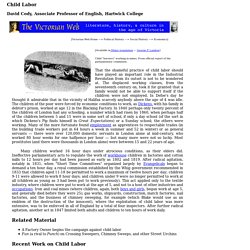
Landow] Child "hurriers" working in mines. From official report of the parliamentary commision. That the shameful practice of child labor should have played an important role in the Industrial Revolution from its outset is not to be wondered at. The displaced working classes, from the seventeenth century on, took it for granted that a family would not be able to support itself if the children were not employed. Many children worked 16 hour days under atrocious conditions, as their elders did. Related Material Recent Work on Child Labor Humphries, Jane. Created 1988. BBC Bitesize - GCSE History - Industrial Britain 1750-1900 overview - OCR B - Revision 3.
Women, Nature, and Capital in the Industrial Revolution. John Bellamy Foster is the editor of MR and a professor of sociology at the University of Oregon.
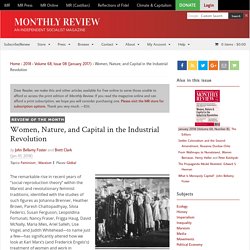
Brett Clark is an associate professor of sociology at the University of Utah. They are coauthors, with Richard York, of The Ecological Rift (Monthly Review Press, 2010). Although all the above points are now conclusively established, a larger synthesis integrating these results with each other and with what decades of intensive historical research have taught us about women and work in the Industrial Revolution is still lacking. The Barnsley pit village that may have been cradle of the Industrial Revolution - Yorkshire Post. Child Labor. The Industrial Revolution and the changing face of Britain. An exhibition at the Barber Institute of Fine Arts (2008-9) During the late 18th and early 19th centuries, Britain experienced change in all aspects of life, as a result of the Industrial Revolution.
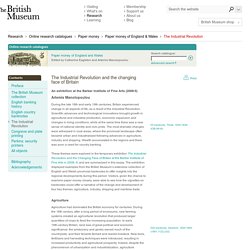
Scientific advances and technological innovations brought growth in agricultural and industrial production, economic expansion and changes in living conditions, while at the same time there was a new sense of national identity and civic pride. The most dramatic changes were witnessed in rural areas, where the provincial landscape often became urban and industrialized following advances in agriculture, industry and shipping.
Wealth accumulated in the regions and there was soon a need for country banking. Economic Growth and the Early Industrial Revolution. This drawing depicts men working the lock on a section of the Erie Canal.
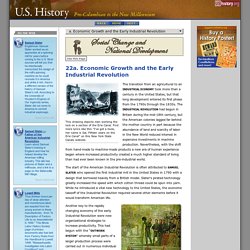
Find more lyrics like this "I've got a mule, her name is Sal, Fifteen years on the Erie Canal" on this New York State Canals website. The transition from an agricultural to an industrial economy took more than a century in the United States, but that long development entered its first phase from the 1790s through the 1830s. The Industrial Revolution had begun in Britain during the mid-18th century, but the American colonies lagged far behind the mother country in part because the abundance of land and scarcity of labor in the New World reduced interest in expensive investments in machine production.
Nevertheless, with the shift from hand-made to machine-made products a new era of human experience began where increased productivity created a much higher standard of living than had ever been known in the pre-industrial world. Report broken link Report broken link Report broken link Report broken link Report broken link. Why the Industrial Revolution didn’t happen in China. (Washington Post illustration; iStockphoto) To economic historians like Joel Mokyr, there's nothing inevitable about the incredible wealth and health of the modern world.
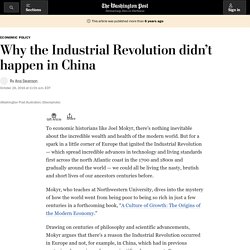
But for a spark in a little corner of Europe that ignited the Industrial Revolution — which spread incredible advances in technology and living standards first across the north Atlantic coast in the 1700 and 1800s and gradually around the world — we could all be living the nasty, brutish and short lives of our ancestors centuries before. Mokyr, who teaches at Northwestern University, dives into the mystery of how the world went from being poor to being so rich in just a few centuries in a forthcoming book, “A Culture of Growth: The Origins of the Modern Economy.” The Rise of Industry. WatchKnowLearn ratings are intentionally harsher than what you might find on YouTube, for example.

Most of our videos have been imported by people who want to use them with kids, not by the creators of the videos. We take a hard-nosed attitude toward quality. Four and five stars should be reserved for really excellent quality. Three stars isn't bad. Lesson: Industrial Revolution. The Industrial Revolution in part was fueled by the economic necessity of many women, single and married, to find waged work outside their home.
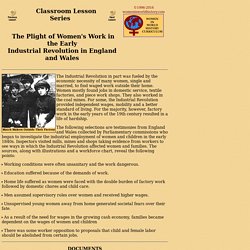
Women mostly found jobs in domestic service, textile factories, and piece work shops. They also worked in the coal mines. Industrial Revolution and the Standard of Living: The Concise Encyclopedia of Economics. Between 1760 and 1860, technological progress, education, and an increasing capital stock transformed England into the workshop of the world.
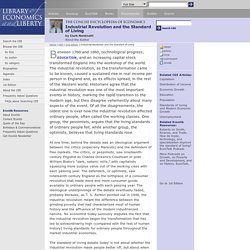
Crime 1750-1900. Did the Industrial Revolution lead to more crime?
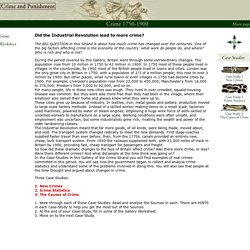
The BIG QUESTION in this Strand is about how much crime has changed over the centuries. Coal and the Industrial Revolution. As of 1860, the United States was an industrial laggard.
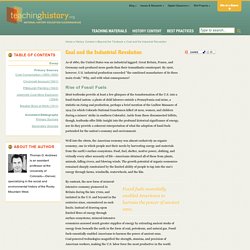
Great Britain, France, and Germany each produced more goods than their transatlantic counterpart. By 1900, however, U.S. industrial production exceeded "the combined manufacture of its three main rivals. " Why, and with what consequences? Rise of Fossil Fuels Most textbooks provide at least a few glimpses of the transformation of the U.S. into a fossil-fueled nation: a photo of child laborers outside a Pennsylvania coal mine, a statistic on rising coal production, perhaps a brief mention of the Ludlow Massacre of 1914 (in which Colorado National Guardsmen killed 18 men, women, and children during a miners' strike in southern Colorado).
Well into the 1800s, the American economy was almost exclusively an organic economy, one in which people met their needs by harvesting energy and materials from the earth's surface ecosystems. The Industrial Revolution in the United States - Primary Source Set. Industrial Revolution Exclusive Videos & Features. You're almost done!
You will soon receive an activation email. Once you click on the link, you will be added to our list. If you do not receive this email, please contact us. To ensure delivery to your inbox, add us to your address book. Oops, there's a problem. This email address has previously opted out from receiving any emails from HISTORY and/or A+E Networks. Childhood Lost - Child Labor During the Industrial Revolution. Childhood Lost: Child Labor During the Industrial Revolution Introduction | Primary Sources and Analysis Tools Library of Congress Resources | Primary Source Set Choose a link below to access printable PDF versions of these materials including additional information, color images and citations.Childhood Lost:Child Labor During the Industrial Revolution Resource Booklet | Primary Source Set Introduction.
The Industrial Revolution. Untitled. The political and moral advantages of this country, as a seat of manufactures, are not less remarkable than its physical advantages. The arts are the daughters of peace and liberty. In no country have these blessings been enjoyed in so high degree, or for so long a continuance, as in England. The Industrial Revolution: Why Britain Got There First. Painting depicting the opening of the Liverpool and Manchester Railway in 1830, the first inter-city railway in the world.Many observers of modern social science are convinced of the maxim: 'There are three kinds of lies: lies, damned lies, and statistics'. Yet good historical scholarship has always used statistics as the antidote to the ‘damned lies’. This is especially useful with the Industrial Revolution, where wild theories dominate. Below I examine three famous theories of the Revolution and show why they do not tell us the whole story.
Underpinning my analysis is the recent work of Professor Nicholas Crafts, Professor of Economics and Economic History at the University of Warwick. In November the Legatum Institute welcomed Professor Crafts to explore the question: ‘why Britain got there first?’ What do we understand by ‘Britain was first to industrialise’? Industrial Revolution. Industrial Revolution, power loomHulton Archive/Getty Imagesin modern history, the process of change from an agrarian, handicraft economy to one dominated by industry and machine manufacture. The Industrial Revolution.
The Industrial Revolution and the changing face of Britain.